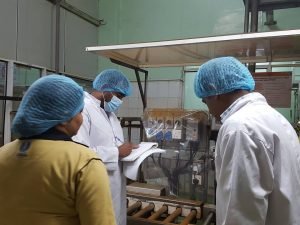Food safety audits are a type of assessment that is conducted to ensure that an organization is following best practices when it comes to handling food. There are many different types of audits that can be completed, but a food safety audit is specifically designed to check for potential areas of risk as it pertains to food contamination. These audits often involve checking specific points in the handling process for any risks and creating a report that details the areas in which the business needs to take actionable steps in order to reduce any risks of food-borne illness. Audits should not be frightening or stressful but rather viewed as an opportunity for improvement. Food safety audits are beneficial because they offer insight on whether your company has everything in place to prevent contamination. The primary goal is to help you identify and correct any issues before they become widespread problems within your organization.

What Are the Benefits of Food Safety Audits?
If you want to protect your customers from food-borne illness, one of the easiest ways to do so is through regular audits. With a food safety audit, you can check that all employees are following proper procedures and helping to reduce the risk of contamination. This will allow you to make any adjustments that may be necessary. Audits are especially beneficial for restaurants with a high volume of traffic where food safety is a serious concern. By regularly completing audits, you can make sure that all employees are following the proper protocol and that your restaurant is in compliance with all regulations. When employees understand what is expected of them and they know they will be held accountable if they fail to meet those expectations, there is a greater chance that they will consistently follow the rules.
Who Can Conduct a Food Safety Audit?
The food safety audit can be conducted by anyone who has experience in the food service industry. Many organizations will send a food safety auditor to your business to perform the audit. An inspector can also perform the audit, but this is normally reserved for more serious situations where there is a risk of imminent contamination. With that being said, it is important to remember that every audit is subjective. Depending on the auditor, there is a chance that your business may not receive the same feedback as other businesses. If you are able to choose who conducts the audit, you can choose someone who you believe will provide you with constructive feedback. This can be beneficial because it will help you identify the areas in which your business needs to improve in order to better safeguard against food-borne illness.
How Often Should You Conduct a Food Safety Audit?
The frequency of your audits will depend on the type of food you serve and the regulations in your jurisdiction. For example, if you serve food that is consumed raw and requires refrigeration, you will have to complete different types of audits than someone who sells ready-to-eat food that is cooked on site. When you receive your permit, you will have to maintain your food safety standards. If there is a complaint made against you, you will receive a correction order, which will outline steps you need to take to correct the issue. By conducting regular audits and identifying any issues, you can quickly correct them and make sure they do not become a widespread problem.
Identifying Potential Areas of Risk
The most important part of the audit is identifying potential areas of risk. This is the part of the audit that will help you make changes in your business and prevent food contamination from occurring. At the end of the audit, the auditor should provide you with a feedback form that will outline how you can improve your operation. Once the auditor has identified two or three areas in which your business needs to improve, the auditor will then walk you through the process of correcting the problems. In some cases, the auditor may check off areas that you already have in place but may not be following correctly. This is not something that needs to be corrected immediately as long as it is being done correctly.
Conclusion
Food safety audits are a very important part of food safety. They can be conducted by anyone with experience in the food industry. If you want to protect your customers from food-borne illness, one of the easiest ways to do so is through regular audits. With a food safety audit, you can check that all employees are following proper procedures and helping to reduce the risk of contamination. This will allow you to make any adjustments that may be necessary. Audits are especially beneficial for restaurants with a high volume of traffic where food safety is a serious concern. By regularly completing audits, you can make sure that all employees are following the proper protocol and that your restaurant is in compliance with all regulations.
